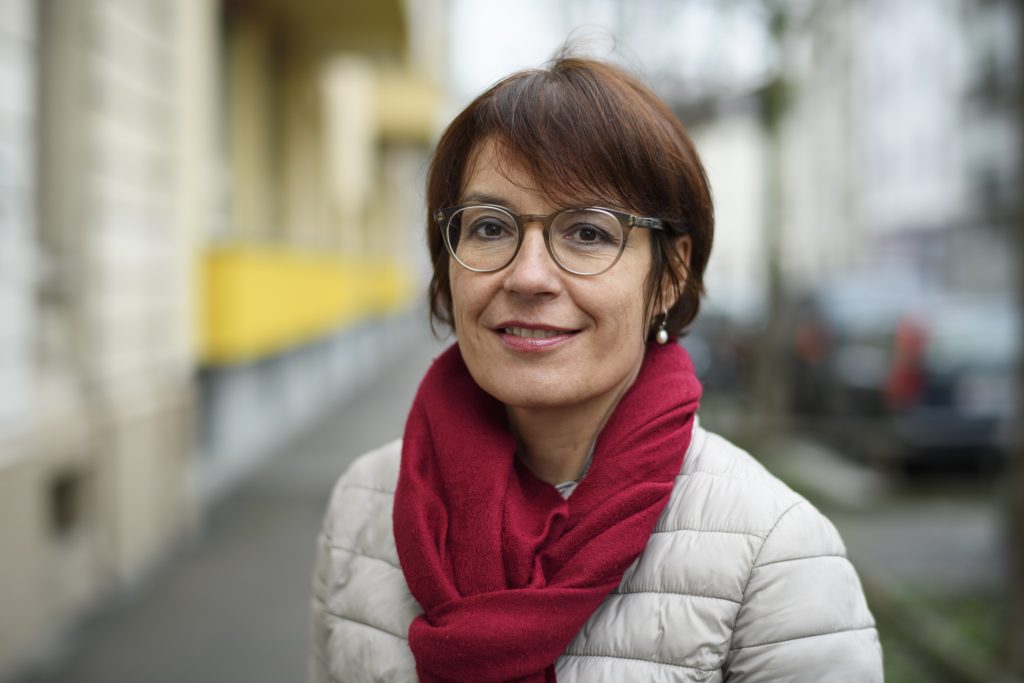This post is also available in:
 Deutsch
Deutsch
The corona crisis falls in the middle of the WHO’ s Year of the Nurse and the Midwife. With the publication of these interviews taken before the Covid-19 outbreak, we would like to express our gratitude and recognition for the nurses’ vital work.

Elisabeth Kurth is the managing director of «familystart», a network of midwives based in Basel-Stadt and Baselland. The network cooperates with local maternity hospitals to promote postnatal care by midwifes for all families with newborns. Elisabeth Kurth was the first midwife to obtain a doctoral degree in applied research at the University of Basel. Even though she is now mainly engaged in teaching and research, she still finds time to visit mothers and newborns in difficult social situations.
Interview: Ursula Reis
You have been managing director of the «familystart» since its foundation. What are the goals of the network? What has been achieved in recent years?
Elisabeth Kurth: Our aim is to ensure that as many mothers as possible receive care at home after leaving hospital, regardless of whether they have been able to organize a midwife themselves or not. We work together with maternity hospitals in the Basel area. The mothers learn about us in the maternity wards and can register directly for the placement of a midwife. The costs are fully covered by health insurance. An evaluation in 2016 showed that after five years, the proportion of mothers with newborns in our partner hospitals who had a midwife visiting them at home has already risen from 78 to 97 percent.
In 2018, «familystart» was expanded to include the project «Sorgsam – support at the start of life». We assume that with the increase in target group reach, midwives are more likely to visit vulnerable families. We had more and more midwives reporting on demanding family situations. If mothers have no support, acute poverty, domestic violence or mental illness come into play, midwives are responsible to assess the risks for mother and child and to organize appropriate help. «Sorgsam» offers all midwives in the «familystart» network a hotline for support in risk situations. They can discuss the problems with an experienced midwife and decide on further steps according to the four-eye principle. In most cases, the families are referred to social aid services. However, there are also cases where a report of endangerment to the children and adult protection authority (KESB) is necessary.
Because additional coordination services are not reimbursed by health insurances, we have set up a hardship fund. Midwives can use this fund to get paid for their often time-consuming non-medical services in risk situations.
You have a teaching position at the ZHAW Institute of Midwifery and are doing research at the Swiss Tropical and Public Health Institute in Basel. What are your research topics?
Last year, I was involved in a study by the Federal Office of Public Health (BAG) on telephone interpreting in midwifery practice. We provided «familystart» midwives with a free telephone interpreting service for communication with migrant women. It was used only very sparingly. We identified possible hindrances in group discussions. The daily practice of midwives strongly relies on non-verbal communication. A midwife will show with gestures rathter than words how a child is breastfed or changed. This kind of communication helps to build trust and is perceived by midwives as intuitive and respectful. The use of an external interpreter however, was seen by some respondents as a possible impairment of a trusting relationship and was therefore avoided. The interpreting service was used more often when the verbal or non-verbal communication of the mother indicated that relevant information could not be transmitted or when emergencies arose.
Now I am evaluating «Sorgsam – support at the start of life». It is already apparent that midwives coordinate with quite a variety of actors in risk situations. The helpline and the hardship fund are used regularly. Some very serious cases were discovered. This service is urgently needed.
I am talking to you today on the occasion of the «Year of the Nurse and Midwife» the WHO is proclaiming worldwide for the year 2020. What does this year mean to midwives in Switzerland? How can they be strengthened?
Midwives play an important role in early child development at the intersections of health and social care. They can help ensuring that no child falls through the cracks. We need more recognition for the psychological aspects of the midwives’ work and their contribution to integration.
In terms of educational policy, we midwives in Switzerland are in a good position. Midwifery training at Bachelor level is a success. I am very pleased that the ZHAW and the Berne University of Applied Sciences are now also offering a master’s course in midwifery. Every profession that wants to develop qualitatively needs its own research. For midwives, a master’s degree is a way of qualifying additional roles, for example, to support other midwives as an expert in complex situations or to pursue a career as a lecturer.
—
Ursula Reis is a subject specialist at the Main Library – Medicine Careum
